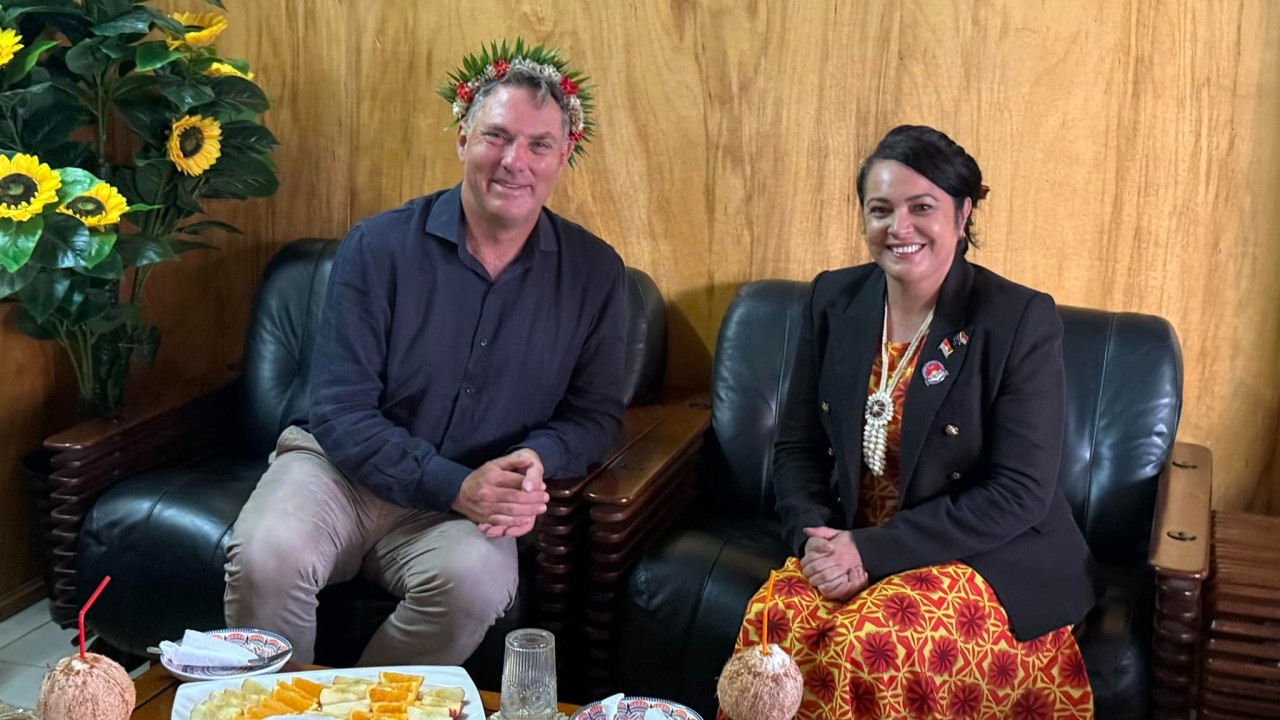By Ruth Cross Kwansing, Kiribati Minister of Women, Youth, Sport and Social Affairs
Last week, our nation welcomed Australia’s Deputy Prime Minister Richard Marles. While the visit was exciting for all of Kiribati, it was particularly significant for me. As a newly appointed Cabinet Minister, I was tasked during our Cabinet meeting led by Minister in Charge Alexander Teabo, with the humbling responsibility of greeting DPM Marles at the airport on behalf of our government. Standing on the tarmac at 6:30 am, I prayed that our distinguished guest would feel the warmth of Kiribati’s hospitality, and the depths of our gratitude.
What I didn’t fully appreciate until this visit, was the magnitude of DPM Marles’ own affection for Kiribati. His connection to our islands dates back to 2003, and he spoke warmly of Kiribati as his second home.
The importance of this long(est)-standing diplomatic relationship heightened the stakes for bilateral discussions with DPM Marles and his team, with our Vice President Dr. Teuea Toatu and four other Cabinet Ministers including myself.
DPM Marles posed a question that, in many ways, went against the grain of our Pacific way – a culture deeply rooted in reciprocity and respect. He asked each of us, point-blank, if there was anything we were not happy with regarding Australia’s support. Was there anything we felt Australia could improve?
This question caught us off guard. In our preparations for the visit, we had focused on expressing gratitude for Australia’s ongoing assistance. We meticulously reviewed the support provided to our respective Ministries and discussed how best to convey our appreciation including traditional greetings and ceremonies.
No one had considered voicing any dissatisfaction.
I hesitated at first. But as te nati ni Kiribati and te nati n Australia, I felt like I could say it.
“I believe Australia can do more.” Then pointed out the other realities. Australia’s GDP last year was approximately USD$1.7 trillion, with $14.5 billion (US$9.11 billion) generated from the fossil fuel industry alone.
While Australia’s $2 billion (US41.25 billion) in development assistance to the Pacific is significant, positioning Australia as the Pacific’s largest development partner, it pales in comparison to the profits reaped from industries driving the climate crisis that threatens to engulf the most vulnerable of the Pacific Islands like Kiribati, Tuvalu, and the Marshall Islands.
Kiribati has received around $145 million (US$91 million) in aid from Australia since 2020. While this support is vital, it’s a drop in the ocean of our problems with combating the escalating impacts of climate change.
We need increased financial investment to equip our people, our youth, our future leaders and our children with the knowledge and skills they need to adapt to this new reality.
Ultimately, investing in our people is about more than just individual resilience. It’s about building a nation capable of navigating the challenges of climate change. This means supporting education and training programs that foster innovation and leadership in areas that are new frontiers for us: desalination, renewable energy, sustainable resource management and climate-smart infrastructure.
Kiribati is facing the uphill battle of change and adaptation. Right now, our government budget could only afford more sacrifices, slashing budgets across Ministries to ensure fiscal stability, when what we REALLY need is to shift the dial dramatically on economic growth and increase our GDP.
Our new government manifesto reflects that in 149 different ways, rippling across all four pillars of the KV20 vision designed by our President HE Taneti Maamau, and it reminds me of a quote by Anais Nin: ‘And the day came when the risk to remain tight in a bud was more painful than the risk it took to blossom.’
We need to make those painful changes. As they say, the definition of insanity is doing the same thing over and over and expecting a different result.
DPM Marles listened, and reaffirmed Australia’s commitment to doing more as “a best friend to the Pacific” and I’m excited about what that means.
Excited about real action, recognition of the interconnectedness of our destinies and a shared commitment to a future where all Pacific nations can thrive.
As we watched the Royal Australian Air Force flight disappear into the sunrise early that next morning, I felt the peaceful feeling of hope and happiness. As did my five-year-old son Asa, who asked pertinent questions about DPM Marles, and then asked me for an RAF plane. We walked back inside holding hands and smiling.
I look forward to the health, peace and prosperity of all nations, because the timeless adage is true. United we stand, divided we fall.
Thank you, Australia, for your friendship.















